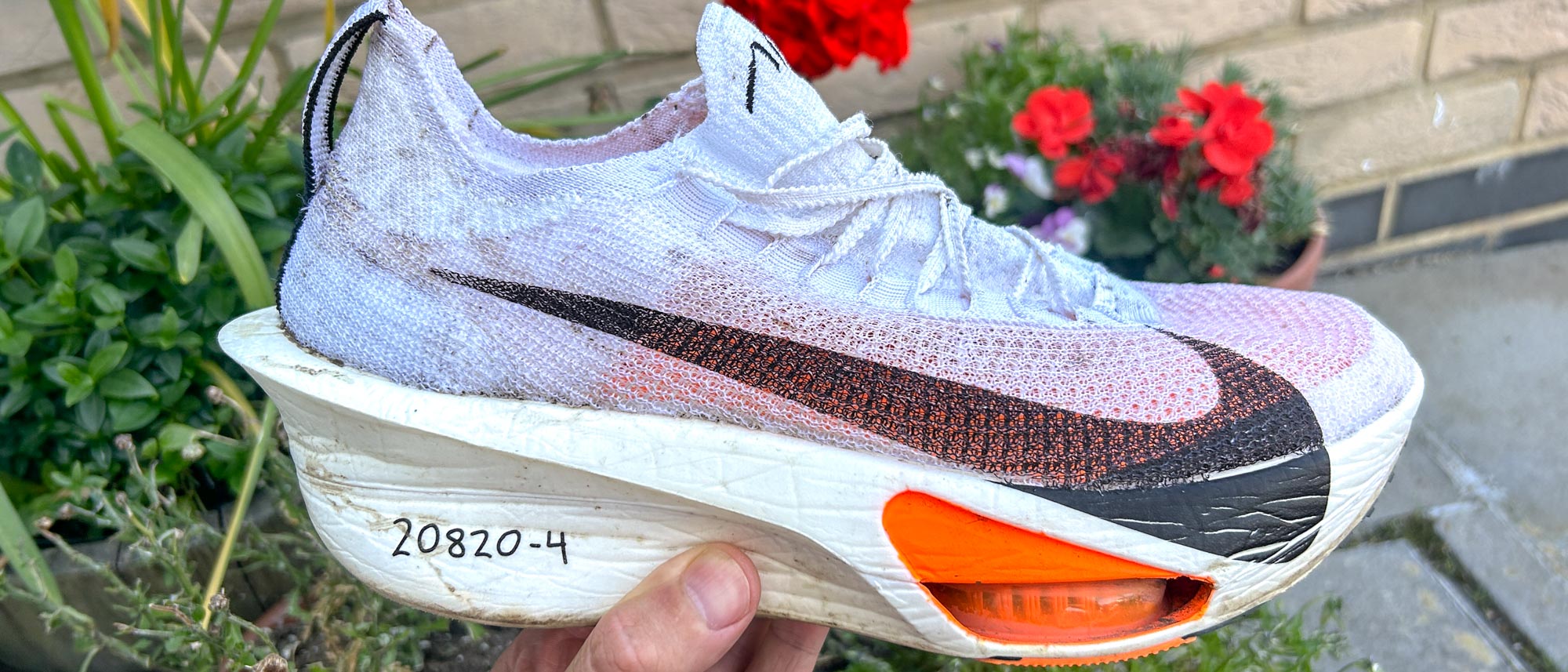Tom's Guide Verdict
The Nike Alphafly 3 is a very different shoe to the Nike Alphafly 2, and it’s a better one for racing, with a lighter design and a more aggressive ride. It’s Nike’s greatest racing shoe yet, and one of the very best available from any brand.
Pros
- +
Fast, efficient ride
- +
Lighter than past Alphaflys
- +
Comfortable over long distances
Cons
- -
More expensive than other carbon shoes
- -
Less bouncy than past Alphaflys
Why you can trust Tom's Guide
The Nike Alphafly is a shoe with a storied history. Eliud Kipchoge ran the first sub-two hour marathon in the original Nike Alphafly Next%, and set the official marathon world record in the Nike Alphafly Next% 2 at the Berlin Marathon in 2022.
That record was then broken by Kelvin Kiptum at the Chicago Marathon in 2023, and he was wearing the Nike Alphafly 3. It’s a shoe that lives up to the standards set by its predecessors and certainly one of the best carbon plate running shoes.
I think it’s a better all-round racing shoe than the Nike Vaporfly 3, and the best Alphafly yet, though some might still prefer the bouncier feel of the original Alphafly.
Nike Alphafly 3: price and availability
The Nike Alphafly 3 launched in January 2024 with a price of $285, the same price as the Alphafly Next% 2, and is available on the Nike website as well as from third-party retailers. It’s a high price even for a carbon plate running shoe, with most costing around $250, including the Vaporfly 3.
It hasn’t been easy to get hold of the Alphafly 3 so far, with it selling out in hours each time Nike has made it available on its website. It will get easier over time, however, and the Volt colorway of the shoe is currently available in both men’s and women’s sizes.
This is the only color currently on sale, though a white version of the shoe is set to be released on July 3rd ahead of the Paris Olympics as part of Nike’s Blueprint range.
Nike Alphafly 3 review: design and fit
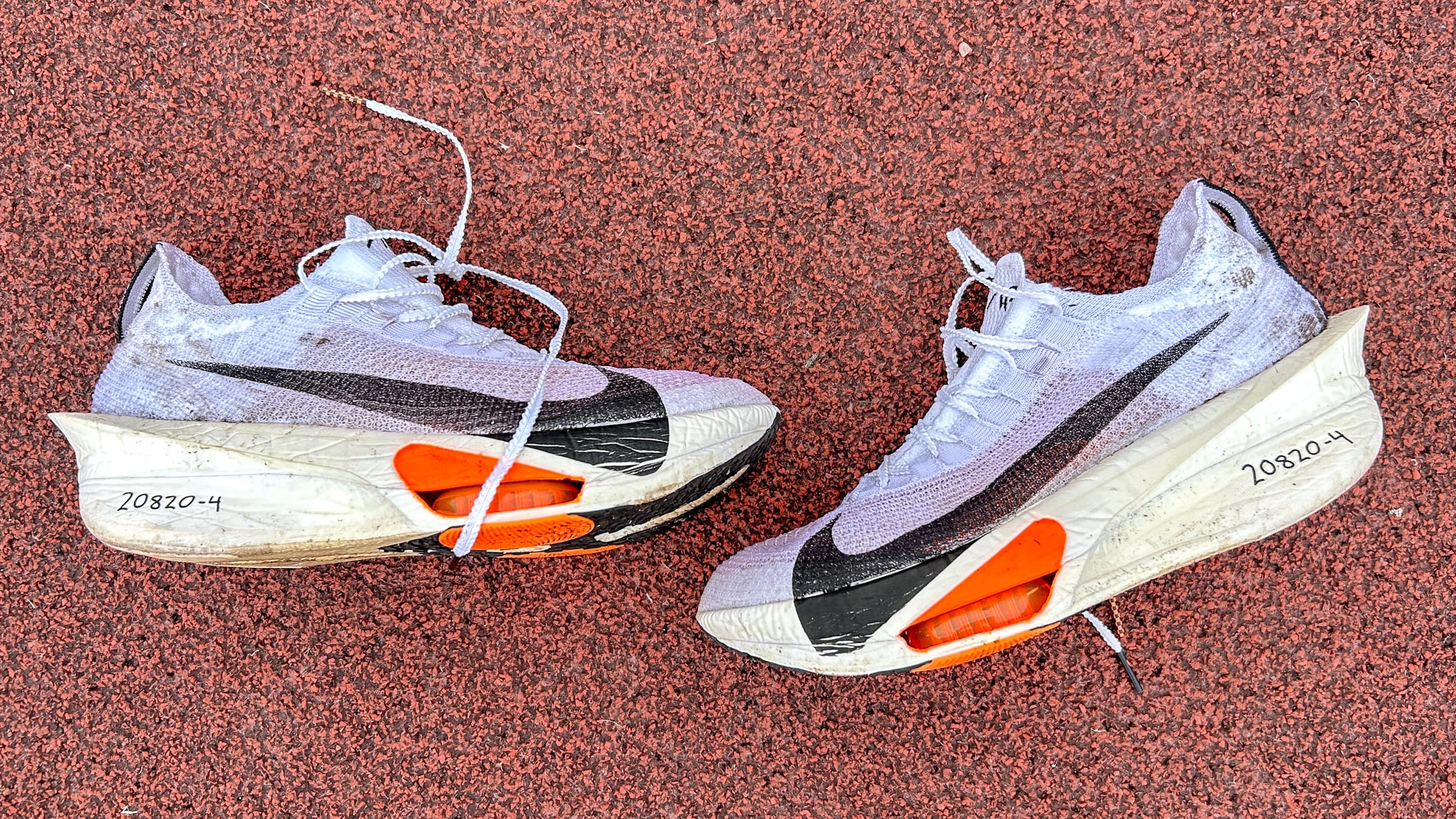
The Nike Alphafly has changed a lot with each version of the shoe, and the updates made to the Alphafly 3 have made it the lightest Alphafly to date. It tips the scales at 7.7oz in my US men’s size 10, over an ounce lighter than the Alphafly 2, which is 8.8oz in the same size. The original Alphafly NEXT% is 8.1oz in my size.
One thing that hasn’t changed about the shoe is the fit — I have the same size in the Alphafly 3 as the past versions and other Nike running shoes, and it fits me well. The bootie-style upper holds the foot securely and comfortably for fast running, and there’s less pressure on the arch than with past models, which were uncomfortable in that area for many runners.
Upper
The Nike Alphafly 3 uses a new Atomknit 3.0 material for its upper. It’s a very open knit material that is highly breathable and also drains quickly if you have the misfortune to race in very wet conditions.
There are new integrated eyelets on the bootie-style tongue, which has padding to reduce lace pressure when you do the shoe up tightly. There is also padding around the back of the shoe and a small internal heel counter to add some stiffness and stability.
Overall, I found the upper works well in holding the foot tightly without causing any discomfort during longer runs and races. I’m also a big fan of the bobbly laces on the shoe, which feel very secure and have never come undone for me during a run.
Midsole
As with past models the Alphafly 3 has a midsole made mostly from Nike’s Peba-based ZoomX foam, the same bouncy material that’s used in the Vaporfly. It also has two Air Zoom pods under the forefoot of the shoe, which are firmer than the ZoomX foam and add more bounce to the ride — these pods are the main difference between the Alphafly and the Vaporfly, with the latter having a midsole entirely made from ZoomX.
There is a full-length carbon plate running through the midsole, which stabilizes the soft, springy foam and adds more propulsion itself. You can see the plate through a long cutout on the bottom of the shoe.
One big difference between the Alphafly 3 and past models is that it has a continuous midsole running the length of the shoe, whereas the Alphalfy 1 and 2 had big cutouts in the middle that separated sections of foam under the heel and under the forefoot.
This new continuous midsole design creates a more fluid transition from heel to toe, and pushes you onto the springy Air Zoom pods more effectively.
Outsole
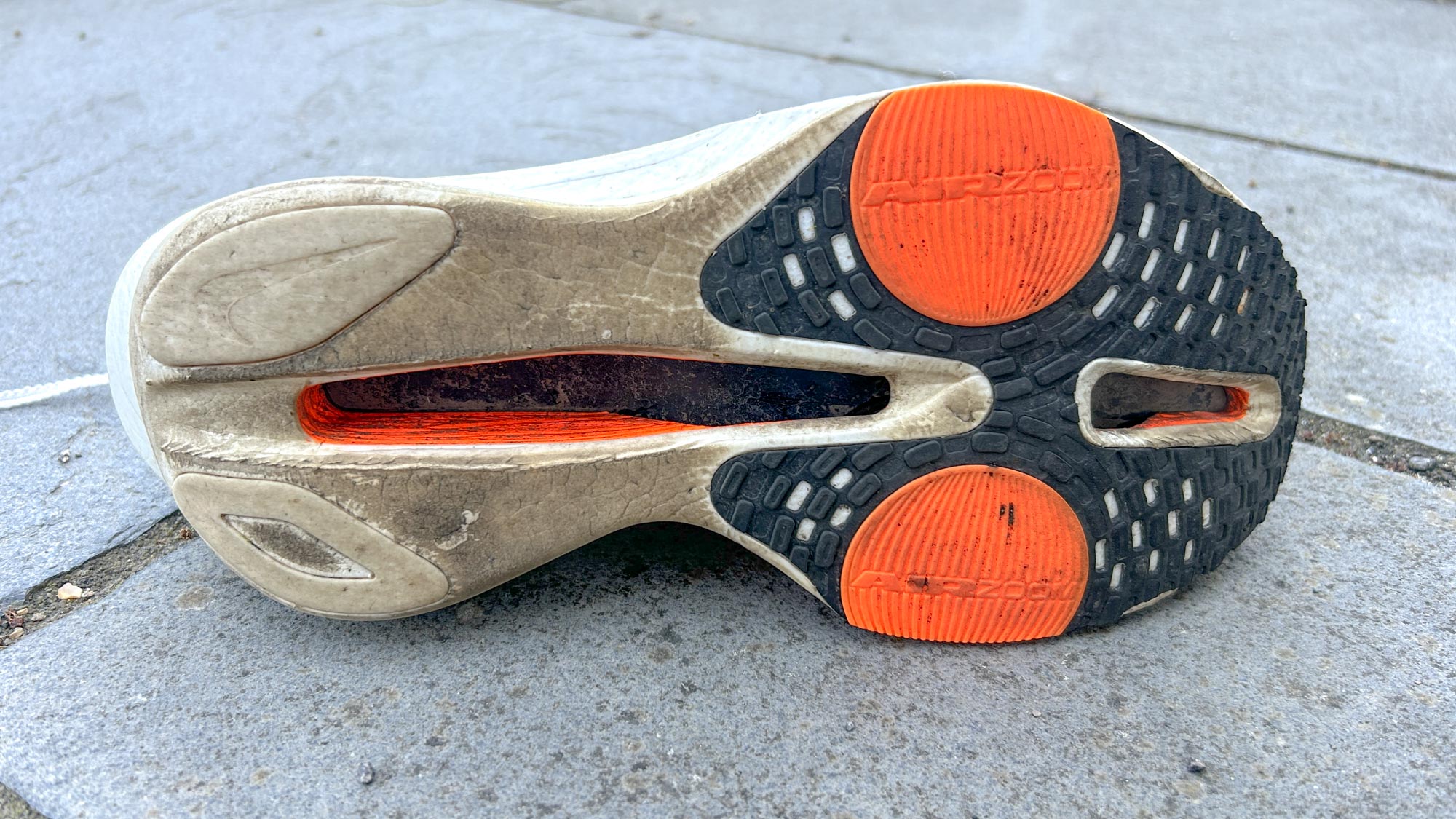
The Alphafly 3 has a new FastShot rubber outsole, with good coverage on the forefoot and then two small sections of rubber at the heel. The shoe has gripped well for me in wet conditions, and I’ve also not seen any undue wear and tear after 80 miles of running — the exposed foam in the midsole is now discolored, but the rubber sections at the heel are still intact.
It’s a more durable outsole design than that of the Vaporfly 3 in particular, which wears down quickly, and in general I think the Alphafly 3 is the more long-lasting racing option within Nike’s range.
Nike Alphafly 3 review: running performance
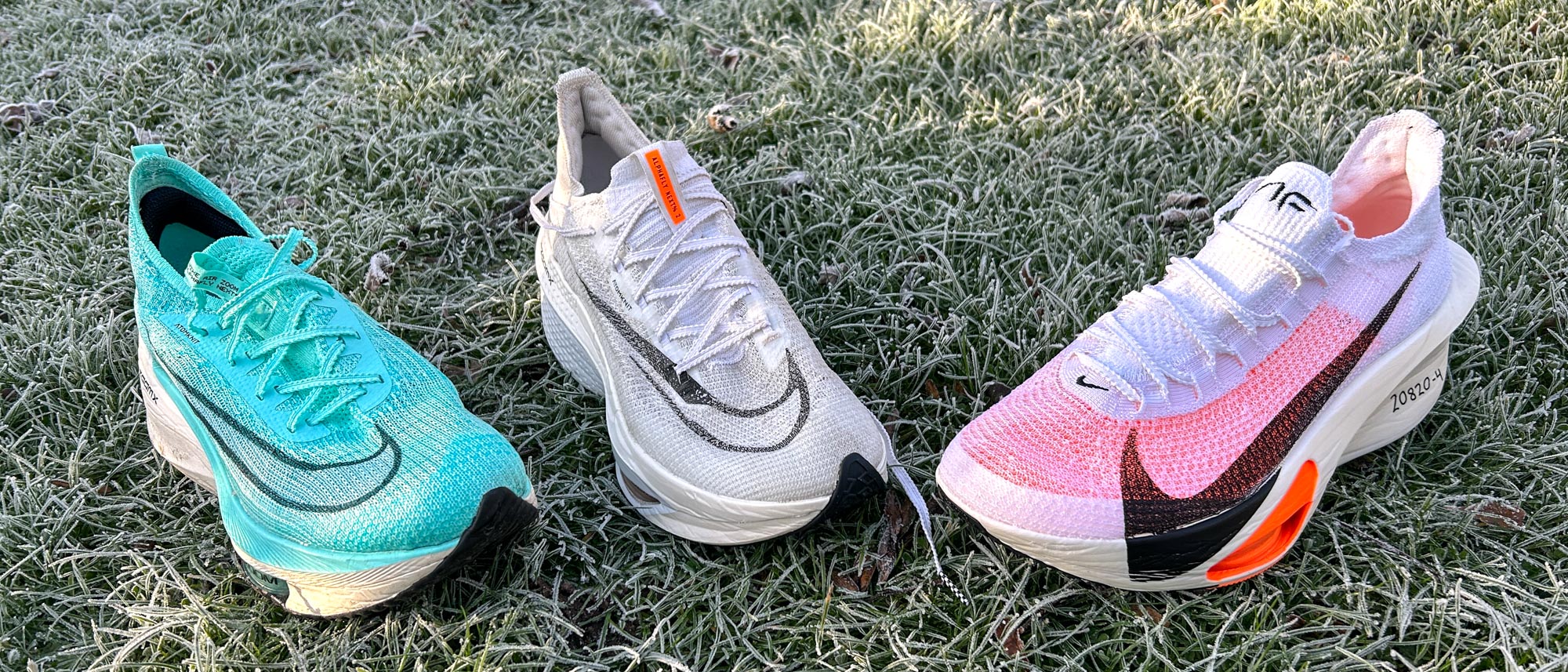
I’ve run sub-2:30 marathons in both the original Alphafly and Alphafly 2 and count both among my favorite carbon racing shoes. After 80 miles in the Alphafly 3, having raced 5K and 10K events in the shoe and done long runs of up to 20 miles during marathon training, I can say it's my favorite version of the shoe yet.
The new continuous midsole provides a faster transition onto your forefoot and makes it easier for me to engage the Air Zoom pods. The shoe is not as bouncy as the previous models, but now has a smoother and more aggressive ride. It almost feels like a cross between the Vaporfly and Alphafly as a result, especially as it’s lighter than past Alphaflys and has the same 8mm heel-to-toe drop as the Vaporfly 3.
Some runners might miss the springy feel of the Alphafly 1 in particular, but when I felt tired late in races and hard training runs I preferred the faster transition and ‘tip-forward’ feeling of the Alphafly 3, which made it easier to keep turning my legs over and maintain my pace.
I run with a high cadence and have quite a shuffling style, so if you have more of a loping gait then the bouncier feel of the older Alphafly models might be preferable, but whatever your running style the Alphafly 3 is certainly going to be a very quick option for your races.
Owing to the fact it’s lighter than past versions and has that snappier ride, the Alphafly 3 is a better short-distance racing option than the Alphafly 2 in particular, which was best over the marathon. I enjoyed racing 5K and 10K in the shoe, and also my long runs — it’s a standout racing option for any distance event. The stack height is around the 40mm limit at the heel in line with World Athletics regulations, and so you have plenty of comfortable foam underfoot for the marathon.
As with most carbon plate running shoes the Alphafly 3 is not a stable shoe and it’s not one I would recommend for walking or even easy runs, because it’s very expensive as well as unstable — save this shoe for race day and a few key training sessions.
Should you buy the Nike Alphafly 3?
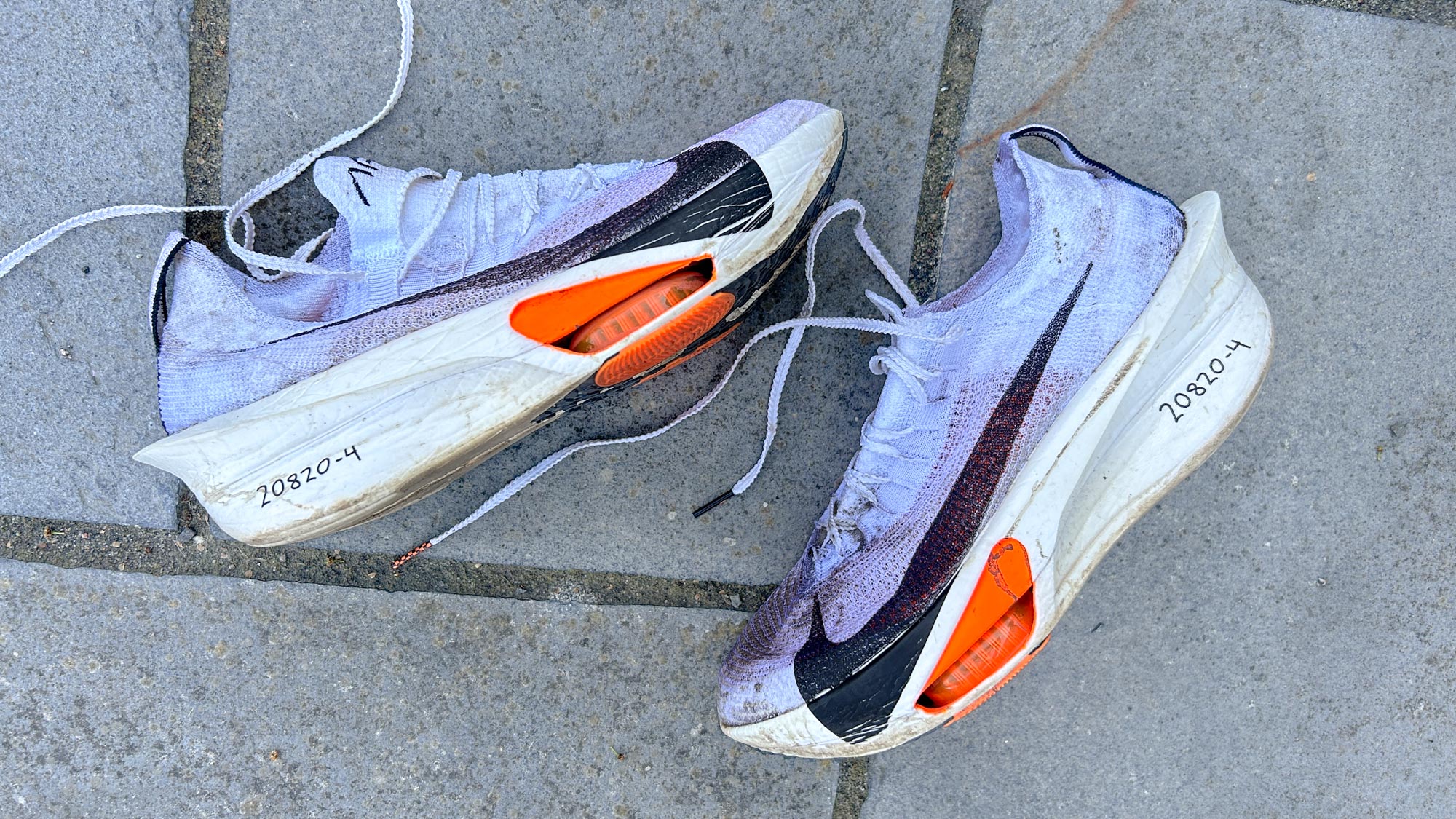
The Nike Alphafly 3 is an outstanding racing shoe and will not disappoint if you pick it up for running events of any distance. It’s comfortable for marathons, and the new midsole design is effective in helping you to maintain your pace deep into hard runs when you’re starting to tire.
It’s very expensive, however, even compared to other carbon plate running shoes, and if you pick up the Nike Vaporfly 3 for less that is also an amazing shoe for races of any distance. Also, while I do prefer it myself, the Alphafly 3 is also not a huge step in performance on past models, so if you have the Alphafly 1 or 2 already there’s no need to rush to upgrade.
Even stronger competition comes from the Asics Metaspeed Sky Paris, which is also cheaper than the Alphafly and also much lighter. The Metaspeed Sky Paris is my favorite racing shoe currently and I used it for the London Marathon this year ahead of the Nike Alphafly 3.

Nick Harris-Fry is an experienced health and fitness journalist, writing professionally since 2012. He spent nine years working on the Coach magazine and website before moving to the fitness team at Tom’s Guide in 2024. Nick is a keen runner and also the founder of YouTube channel The Run Testers, which specialises in reviewing running shoes, watches, headphones and other gear.
Nick ran his first marathon in 2016 after six weeks of training for a magazine feature and subsequently became obsessed with the sport. He now has PBs of 2hr 27min for the marathon and 15min 30sec for 5K, and has run 13 marathons in total, as well as a 50-mile ultramarathon. Nick is also a qualified Run Leader in the UK.
Nick is an established expert in the health and fitness area and along with writing for many publications, including Live Science, Expert Reviews, Wareable, Coach and Get Sweat Go, he has been quoted on The Guardian and The Independent.
